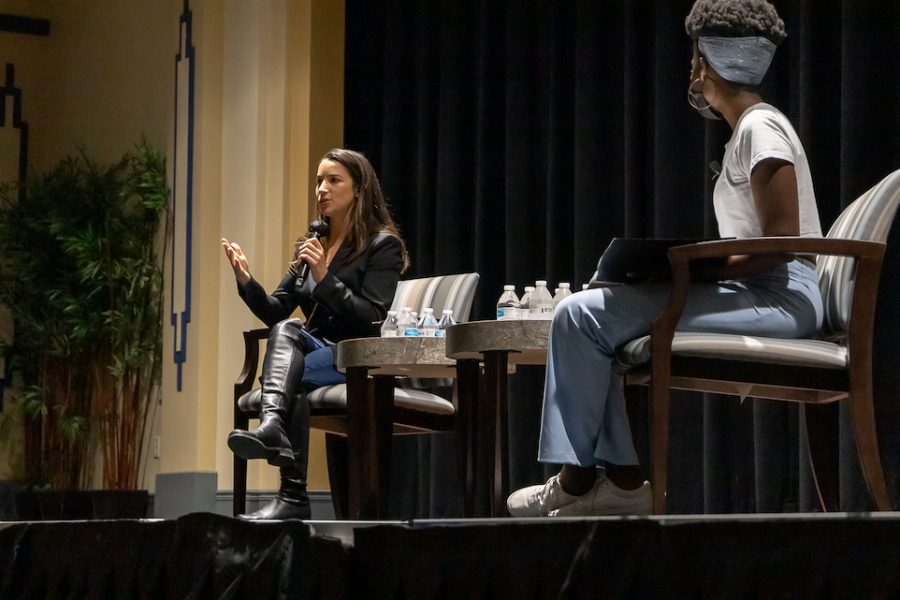‘Continuing to speak up’: Aly Raisman discusses gymnastics journey at PPC event
Lucas Zheng | Staff Photographer
Aly Raisman, a retired gymnast and two-time American Olympian, spoke at a Pitt Program Council event on Monday night.
November 9, 2021
Aly Reisman dedicated her life to gymnastics from the time she was eight years old. She said she repeatedly watched VHS tapes of Olympic gymnasts and tried to copy their moves and bring them into her own practice.
“It was kind of crazy that I decided to only do gymnastics at the time, but I loved it so much that it was a no-brainer,” Raisman said. “That’s one of the best things about being a kid 一 there’s no dream that feels too big.”
Pitt Program Council hosted “A Conversation with Aly Raisman” on Monday night in the William Pitt Union to an audience of about 500 students. Raisman, a retired gymnast and two-time American Olympian, opened up about her career as well as her experience with sexual abuse during her time on the USA Gymnastics team.
PPC designed this event to help rebuild a sense of community after being unable to have in-person lectures last academic year, according to Nick Jones, PPC’s public relations director.
“It’s great to have a sense of community again, and this lecture event helps to accomplish that,” Jones said. “Everyone in one room, hearing the same thing and engaging in a discussion about the topics that are being covered is what we really are aiming for here.”
The event consisted of a 45-minute interview with Immanuela Obisie-Orlu, followed by a 15-minute audience Q&A.
Raisman participated in the 2012 and 2016 Olympics as captain of the “Fierce Five” and “Final Five.” She is a survivor of the USA Gymnastics sexual abuse scandal and came forward about her experience in 2017. She is now 27 years-old and uses her platform to raise awareness of sexual assault.
“Continuing to speak up about sexual abuse and healing on my own is the most important thing to me — I am very passionate about giving survivors support,” Raisman said. “The more we realize we’re more of the same by normalizing tough conversations, the quicker we can all get through our dark days.”
She said she thinks in order for the quality of athletes’ lives to improve, they need to be more open about how they feel — as they are constantly facing pressure from judges and coaches. This especially can have an impact on athletes’ lives after their career.
“After being an athlete, as you go through the real world, people can say anything critical, especially on social media. Just because they say those things doesn’t mean they’re right,” Raisman said. “Taking care of yourself and taking criticism is a really important balance.”
Lydon Pelletier, the lecture director of PPC, said she was looking forward to Raisman’s talk because she admired the ideas in her book, “Fierce: How Competing for Myself Changed Everything.”
“In her book, she talked a lot about body positivity, sexual assault and her experiences with it. So I think conversations pertaining to those can be important for our students to hear,” Pelletier said. “I think she’s a positive role model for women, which makes her a great person for the student body to hear from.”
Raisman testified this September in front of the Senate Judiciary Committee alongside fellow gymnasts about their experiences with sexual abuse. Her documentary — “Aly Raisman: Darkness to Light,” which explores her story of sexual abuse — premiered on Lifetime on Sept. 24. She said she has since concentrated on touring universities around the country to give talks to help end the stigma of conversations about body image, trauma and mental health.
According to Raisman, the national sexual abuse hotline run by RAINN experienced a 99% increase in calls after her documentary aired. She said in the two years it took to make the documentary, she learned about the importance of an open dialogue surrounding conversations about trauma.
“I learned a lot about the power of validation — saying you understand why someone feels the way they do,” Raisman said. “Even if you can’t understand exactly what they’re going through, listening to them and validating them is a beautiful thing.”
Raisman said her talks are also a call to action to hold USA Gymnastics accountable for the instances of sexual assault. The current organization put in place to handle sexual assault reports is called SafeSport, which Raisman said ignores many reports because people in power could lose their jobs.
“Until independent investigations are put in place, until people are educated on types of abuse and there is a safe place to report incidents without retaliation, there isn’t going to be trust,” Raisman said.
Mikaela Baratka, a senior ecology and evolution major, said she thought Raisman was a great role model for the student body because of her extreme resilience.
“I think, especially with the pandemic and everyone learning to be resilient and coming back from COVID, I think that’s definitely something that she is a good role model for. Obviously, she’s had to come back from so much,” Baratka said. “I think it’d be really interesting if not only Pitt, but other organizations and universities, used her story to prevent abuse from happening at all levels.”








